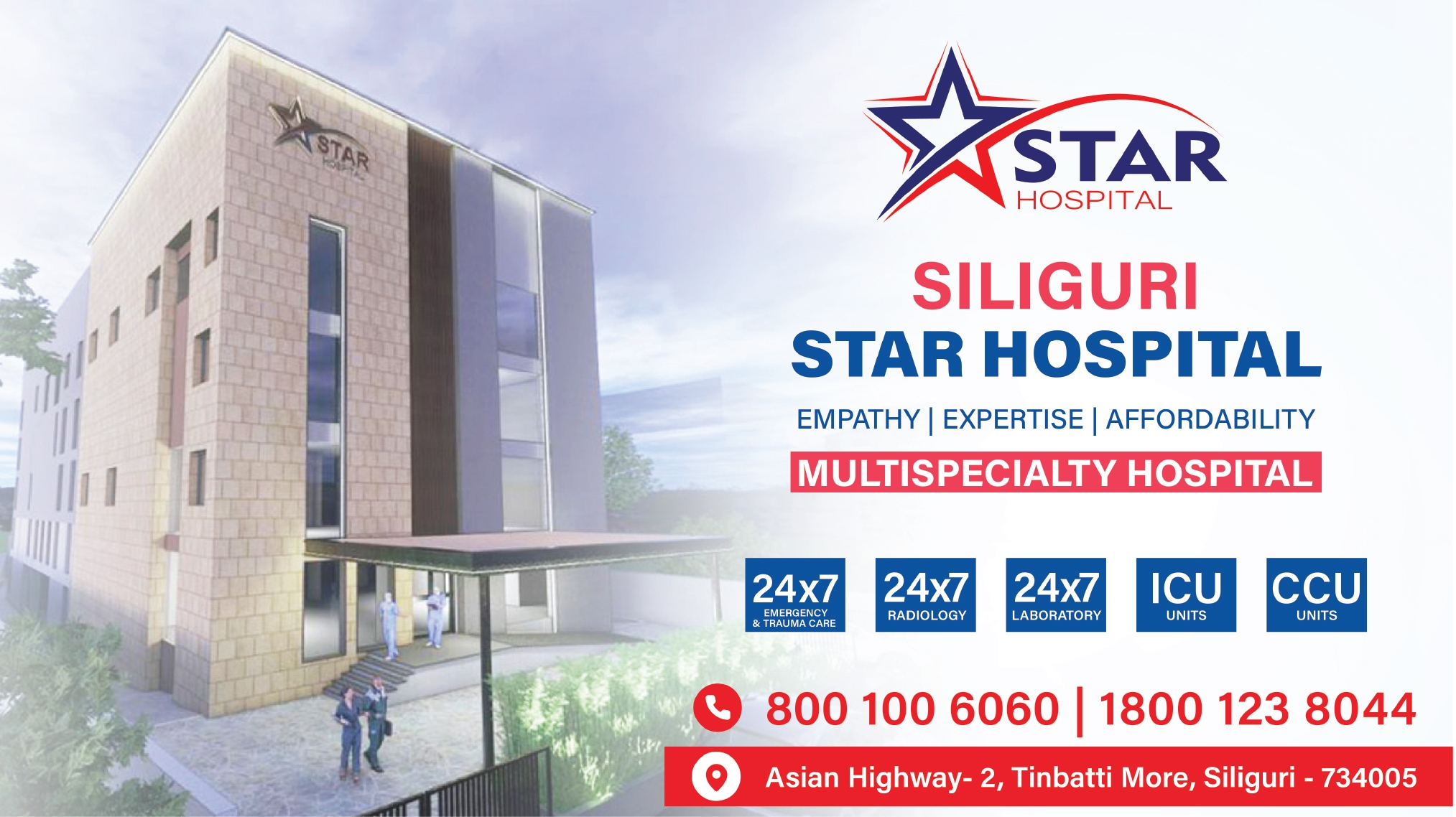Non-Operative Treatment of Urinary Stones: Perspectives from Star Hospital Siliguri's top urologist, Dr. S.K. Jha
Kidney stones, also referred to as urinary stones, affect millions of people worldwide. These hard mineral deposits that form in the kidneys can migrate down the urinary tract if treatment is not received, resulting in severe discomfort and issues. Non-operative treatments frequently prove to be quite helpful for many individuals, especially those with smaller stones or stones in easily accessible areas, even though surgical procedures can efficiently remove larger stones. The top urologist in Siliguri at Star Hospital, Dr. S.K. Jha, offers insightful information about the best non-operative treatments for managing kidney stones.
Knowing About Urinary Stones
Mineral and salt-based urinary stones develop in the kidneys and spread to the bladder, ureters, or urethra, among other areas of the urinary system. These stones can range in size from tiny enough to pass through the body naturally to large enough to obstruct the urinary tract and result in excruciating pain and infection. Common symptoms include painful, frequent urination, nausea, blood in the urine, and severe back or stomach pain.
Kidney stones can be treated with a variety of non-surgical methods, such as:
1. Dietary Modifications
One of the best strategies to treat kidney stones is to make dietary changes. Besides helping small stones pass naturally without the need of invasive procedures, Dr. Jha stresses the importance of diet in preventing the production of new stones.
The Basis of Prevention: Hydration
Diluting minerals in the urine by adequate hydration can help avoid the development of stones. Patients should strive for at least two to three litres of water each day. The crystalline formations that cause kidney stones are less likely to occur in diluted urine. Staying hydrated can help people who are prone to stone development avoid recurrence and aid in the natural flushing out of tiny stones.
Reducing Consumption of Salt
The most prevalent kind of kidney stone, calcium-based stones, can develop as a result of elevated calcium levels in the urine caused by a high sodium diet. A straightforward but efficient strategy to reduce this risk is to consume less salt. Because processed meals, canned soups, and salty snacks are often high in sodium, Dr. Jha advises patients to check how much sodium they consume.
Cutting Down on Foods High in Oxalate
Calcium oxalate stones can develop when calcium in the urine combines with oxalate, a naturally occurring substance present in foods like spinach, chocolate, almonds, and beets. Dr. Jha advises patients who are prone to these kinds of stones to limit their consumption of foods which are high in oxalate, especially when combined with meals high in calcium, as this may make the production of stones more common.
Consumption of Calcium
Foods high in calcium may actually lower the incidence of kidney stones, despite what many people think. While it’s important to avoid excessive calcium supplements, dietary calcium binds with oxalate in the stomach and intestines before it reaches the kidneys, reducing the risk of stone formation. Dr. Jha recommends that patients do consult a nutritionist or dietitian to make sure that they receive proper calcium from food sources like dairy and other products.
2. Pharmacological Treatments
For urinary stones, pharmacological treatments can be lifesaving when dietary modifications are not reaching their goals. When combined with the changes in lifestyle, medicines can help dissolve tiny stones and also prevent new ones from forming.
Pain Management
For individuals with kidney stones, pain management is very important because the pain is very severe. In order to control pain during the passage of stones, non-steroidal anti-inflammatory medications (NSAIDs) and other analgesics are frequently recommended by the doctor. Stronger drugs might be temporarily prescribed in extreme situations. Based on each patient's unique medical history and degree of pain, Dr. Jha tailors pain therapy.
Medications to Prevent Stone Formation
Specific medications can help prevent certain types of stones. For example:
Thiazide Diuretics: These helps reduce calcium levels in the urine, benefiting patients prone to calcium-based stones.
Patients who are at risk of developing uric acid stones are frequently prescribed potassium citrate because it helps lower the acidity of the urine, which reduces the likelihood of the formation of uric acid stones. Frequent check-up guarantees that the drugs are functioning well.
Alpha Blockers for Stone Passage
Alpha blocker medications, such as tamsulosin, relaxes the muscles in the urinary tract. So the stones in the lower ureter can flow freely and painlessly. For people who want to stay away from surgery of any kind, this is a lifesaving alternative.
3. Treatment with Extracorporeal Shock Wave Lithotripsy (ESWL)
Extracorporeal shock wave lithotripsy (ESWL) is an excellent non-surgical treatment for people with stones that don't go away on their own or that don't respond to medication and diet. Expert urologist like Dr. Jha perform this outpatient surgery here at Star Hospital Siliguri which is the only hospital in Siliguri which has the technical expertise to perform it. It uses sound waves to break up stones into smaller pieces so the body may more easily pass them naturally.
The Procedure of ESWL
A machine creates shock waves directed at the stone while the patient is lying down for ESWL. These shock waves target the stones by penetrating the body and breaking it into small pieces. Over the course of a few days or weeks following the treatment, these smaller particles can be dumped out of the body through the urinary tract.
Advantages of ESWL
ESWL offers patients several advantages, including:
Non-Invasive Treatment: Unlike standard surgery, ESWL does not require any incisions.
Minimal Recovery Time: Most patients are able to resume their regular activities within a few days because of the brief recovery period.
Convenience for Outpatients: Since ESWL is usually done as an outpatient procedure, patients can go back to their homes the same day.
Ideal Candidates for ESWL.
Notwithstanding its adaptability, ESWL functions well on stones that are 4 mm to 2 cm in size. Other treatment approaches might be needed for larger stones or those located in specific complex urinary tract regions. Dr. Jha stresses that in order to be certain whether ESWL is the appropriate course of action, a comprehensive evaluation test, including imaging tests is necessary.
Why Choose Star Hospital Siliguri?
A complete treatment to urinary stone is provided by Star Hospital Siliguri, which is hereby acknowledged as the best multispecialty hospital in the area. Under the direction of renowned urologist in Siliguri Dr. S.K. Jha, the urology department combines the latest technology, individualized treatment, and years of experience in non-operative treatments such pharmaceutical treatments, nutritional counselling, and ESWL in order to treat patients with urinary stones. For individuals looking for non-surgical treatments, Star Hospital Siliguri is the best option and for treatments like ESWL Star hospital along with Dr S.K. Jha have the superiority and can help you get better without the intervention of surgical method..
Conclusion
Urinary stone non-operative treatments offer safe, efficient substitutes for surgery. Patients can control their illness with little disruption to their life by combining modern procedures like ESWL which is available only at Star Hospital Siliguri, pharmaceutical choices, and dietary changes. As a first line of defence against urinary stones, Dr. S.K. Jha, the top urologist in Siliguri at Star Hospital, advises patients to investigate these non-invasive treatments, particularly since early detection and preventative care can make all the difference.





